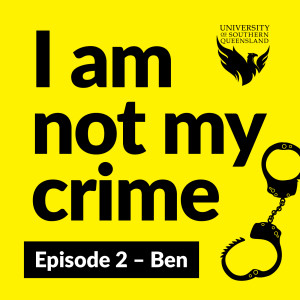Episodes

Tuesday Feb 02, 2021
I Am Not My Crime - Ben
Tuesday Feb 02, 2021
Tuesday Feb 02, 2021
Ben describes his downward spiral from social drug use, which eventually led to international drug trafficking. Through his time dealing drugs and his time in prison, Ben developed a whole range of transferrable skills, which shows that a former inmate can be very valuable to an employer.
"I Am Not My Crime" features courageous people telling you the story about the crimes they have committed and their journey to redemption. As you make your way through this first season you will notice a couple of common themes: the importance of other people, opportunities for employment, and being welcomed back into society are what really matter for supporting change and a life lived differently. "I Am Not My Crime" has been produced to help you understand that for many people it is their circumstances that led them down the path to offending behaviour and that what somebody has done in the past is not an indication of who they are today.
Presented by University of Southern Queensland Criminologist Dr Suzanne Reich, each episode concludes with the latest research about why people commit the crime or crimes that have been discussed.
If this episode brings up any issues, and you need to talk to someone, you can contact Lifeline on 13 11 14 or Narcotics Anonymous on 1300 652 820.
Explore the University of Southern Queensland's Criminology and Criminal Justice degrees: Criminology and Criminal Justice - University of Southern Queensland (usq.edu.au)
REFERENCES
Bahr, S. J, Harris, L., Fisher, J. K. & Armstrong, A. H. (2010). Successful reentry: What differentiates successful and unsuccessful parolees? International Journal of Offender Therapy and Comparative Criminology, 54(5), 667-692. https://doi.org/10.1177/0306624X09342435
Bersani, B., Laub, J. H., & Nieuwbeerta, P. (2009). Marriage and desistance from crime in the Netherlands: Do gender and socio-historical context matter. Journal of Quantitative Criminology, 25(1), 3-24. https://doi.org/ 10.1007/s10940-008-9056-4
Bushway, S. D., & Apel, R. (2012). A signaling perspective on employment-based reentry programming: Training completion as a desistance signal. Criminology & Public Policy, 11(1), 21-50.
Kirk, D. S. (2012). Residential change as a turning point in the life course of crime: Desistance or temporary cessation? Criminology, 50(2), 329-358. https://doi.org/10.1111/j.1745-9125.2011.00262.x
Laub, J. H., Nagin, D. S., & Sampson, R. J. (1998). Trajectories of change in criminal offending: Good marriages and the desistance process. American Sociological Review, 63(2), 225-238.
Laub, J. H., & Sampson, R. J. (2001). Understanding desistance from crime. In M. H. Tonry (Ed.), Crime and justice: A review of the research. Chicago: University of Chicago Press.
Maruna, S. (2001). Making good: How ex-convicts reform and rebuild their lives. Washington, EC: American Psychological Association.
Moffitt, T. E. (1993). Adolescence-limited and life-course-persistent antisocial behavior: A developmental taxonomy. Psychological Review, 100(4), 674-701.
Sampson, R. J., & Laub, J. (1993). Crime in the making: Pathways and turning points through life. Cambridge, MA: Harvard University Press.
Simpson, P. L., Guthrie, J., Lovell, M., Doyle, M., & Butler, T. (2015). Assessing the public’s views on prison and prison alternatives: Findings from public deliberation research in three Australian cities. Journal of Public Deliberation, 11(2). Retrieved from: http://www.publicdeliberation.net/jpd/vol11/iss2/art1
Uggen, C. (2000). Work as a turning point in the life course of criminals: A duration model of age, employment, and recidivism. American Sociological Review, 65, 529-546.
Uggen, C., & Staff, J. (2001). Work as a turning point for criminal offenders. Corrections Management Quarterly, 5, 1-16.


No comments yet. Be the first to say something!